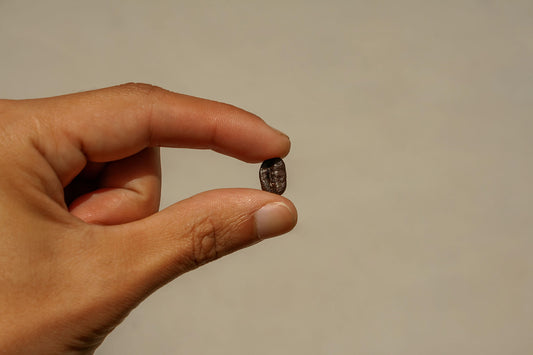Find out how coffee can help your health in many ways, from giving you more energy and brain power to lowering your risk of getting chronic diseases.
As far as health and wellness go, our daily habits are what hold together a lifestyle that is both healthy and energizing. Many people love these habits, but coffee holds a special place in their hearts. Would you believe me if I told you that your morning coffee does more than just wake you up? A lot of people love coffee in the morning, and it has a lot of health benefits that are just waiting to be discovered. From its high level of antioxidants to its ability to speed up the metabolism, coffee is a powerful tool in our quest for health.
In this article, we will learn about the science and stories behind coffee health benefits. That being said, let's raise our cups to the amazing health benefits of coffee and learn about them one sip at a time.
/ IN THIS ARTICLE
01. Essential Nutritional Components Of Coffee
02. Coffee for Healthy Skin, Hair, and Nails
03. Supporting Strong Bones, Joints, and Muscles
04. Coffee as an Immunity Enhancer
05. Antioxidant Benefits of Coffee
06. Coffee's Role in Weight Management
08. Combating Stress and Anxiety with Coffee
09. Coffee and Digestive Wellness
09. Coffee vs. Traditional Wellness Supplements
14. Frequently Asked Questions
15. Conclusion
Essential Nutritional Components Of Coffee
People often say that coffee helps them start the day and focus while they study. But coffee is more than just a comforting drink to wake up to; it's also a nutritional powerhouse full of important nutrients that are good for our health. Studies that were reviewed by doctors have shed light on what's in a simple cup of coffee and found a wide range of substances, each with its own health benefits.
The main thing that makes coffee good for you is caffeine, a well-known stimulant that keeps you from getting sleepy, makes you more mentally alert, and helps you focus. The amazing things that coffee has to offer don't end there, though. Coffee is good for you in many ways, and antioxidants are a big part of that. These natural chemicals help the body fight free radicals, which lowers oxidative stress and might lower the risk of getting chronic diseases.
Coffee also has a number of vitamins, such as B vitamins like niacin (vitamin B3), riboflavin (vitamin B2), and pantothenic acid (vitamin B5). These vitamins are very important for energy metabolism, which means that they make sure that our bodies turn food into energy that we can use.
It's also important not to forget about the minerals in coffee. Potassium and magnesium, which are found in small amounts, help nerves work and keep the heart healthy and blood pressure normal. Together, these minerals and the antioxidants in the drink work to strengthen the body's defences and improve health in general.
As you can see, coffee is a nutritional powerhouse thanks to its many healthy ingredients, such as caffeine, antioxidants, vitamins, and minerals. Every sip of coffee not only wakes you up, but it may also be good for you in a number of ways. This makes it an important part of a healthy diet.
Coffee for Healthy Skin, Hair, and Nails
When consumed as part of a healthy diet, coffee may not only improve overall health but also have positive effects on beauty, especially for women. There are many benefits besides its tasty taste and energising effects. For example, there is evidence that drinking coffee can help keep your skin, hair, and nails healthy.
When it comes to your skin, antioxidants in coffee are very important. These strong chemicals can help keep your skin cells from getting hurt and lower inflammation, which will make your skin healthier and brighter. Also, the caffeine in coffee has been shown to improve blood flow, which can make your skin look better and give it a natural glow.
Coffee can be good for your hair and scalp because it has a lot of antioxidants and caffeine. Antioxidants may help keep hair follicles from getting damaged, and caffeine stimulates hair roots and improves blood flow to the scalp, which may help hair grow in a healthier way.
Coffee is good for more than just your skin and hair. Having coffee every day may also help your nails stay strong. Coffee has nutrients and antioxidants that may help your body make keratin, a protein that helps keep your nails strong and healthy.
Coffee may have even more health and beauty benefits when mixed with other ingredients that are meant to do the same. One great example of this kind of blend is the Collagen Coffee Latte that Juju Blends sells. Adding collagen to coffee, a protein that helps skin stay healthy and flexible, is a creative way to improve your beauty from the inside out while you enjoy your daily coffee. This collagen-infused coffee not only tastes good, but it also gives you nutrients that are good for your skin, hair, and nails, making it a healthy way to start the day.
Supporting Strong Bones, Joints, and Muscles
When it comes to maintaining strong bones, joints, and muscles, your morning cup of coffee could be doing more for you than you think. As part of a balanced diet and active lifestyle, coffee—enhanced with collagen—may indeed offer tangible health benefits for physically active individuals and those seeking to boost their musculoskeletal health.
On the muscle front, caffeine in coffee has been shown to enhance muscle function and physical performance. By stimulating the nervous system, caffeine can energize your workouts, increasing endurance and reducing perceived effort. This makes coffee a popular pre-workout drink for athletes and fitness enthusiasts.
Moreover, when it comes to joint health, research indicates that regular coffee consumption may be linked to a lower risk of developing arthritis. Coffee's anti-inflammatory properties are thought to contribute to this reduced risk, adding yet another layer to the overall health benefits of coffee.
Bridging the gap between coffee's traditional role and innovative health solutions, Juju Blends has once more stepped into the spotlight with their Collagen Coffee Latte. Infused with collagen—a key protein for maintaining the health and integrity of joints, bones, and muscles—this tasty brew takes the potential benefits of coffee to another level. Collagen also helps in supporting muscle mass and strength, making this collagen-infused coffee a great choice for active individuals and those looking to enhance their musculoskeletal health.
Coffee as an Immunity Enhancer
One of the key aspects of coffee that promotes disease resistance is its rich antioxidant content. Antioxidants play a crucial role in protecting the body against oxidative stress and inflammation, both of which can weaken the immune system and increase the vulnerability to health conditions. By neutralizing free radicals, the antioxidants found in coffee can help lower the risk of infection and bolster the body's defenses.
In addition to antioxidants, coffee is a source of essential vitamins and minerals that further contribute to immune health. Nutrients such as magnesium, potassium, and niacin found in coffee can support the function of the immune system, enhancing the body's ability to fight off infections and diseases.
Moreover, research hints at the potential of regular coffee consumption to be associated with a lower risk of certain health conditions. These include some that directly impact the immune system, suggesting that coffee can play a part in creating a more resilient body capable of resisting diseases.
Antioxidant Benefits of Coffee
Antioxidants are compounds that play a vital role in combating free radicals — unstable molecules that can cause cellular damage leading to inflammation, aging, and an array of chronic diseases. By neutralizing free radicals, the antioxidants in coffee help reduce oxidative stress within the body, which can otherwise contribute to the development of health conditions like heart disease, type 2 diabetes, and certain cancers.
The anti-inflammatory properties of coffee further reinforce these benefits. Inflammation is a natural immune response, but when chronic, it can harm the body and lead to various diseases. Coffee's ability to modulate inflammatory processes is yet another example of its protective effects against chronic health issues, contributing to better health outcomes for regular consumers.
The specific antioxidants found in coffee, such as chlorogenic acids, have been extensively studied. These compounds are effective in protecting cells from damage, which is essential for maintaining overall bodily functions and supporting health and longevity.
Research has begun to draw associations between the antioxidant-rich nature of coffee and longevity benefits. Studies have suggested that those who consume coffee may have a reduced risk of premature death, as these antioxidants and their protective effects extend to various bodily systems and processes.
Coffee's Role in Weight Management
Because it contains many bioactive compounds, coffee may help people control their weight. Both of its effects on metabolism and appetite control show why it might be a good addition to a healthy lifestyle.
Coffee can speed up your metabolism by activating the body's thermogenic response, which makes you use more energy. This process not only makes you burn more calories during the day, but studies also show that it can help you burn fat faster. This rise in metabolic rate, caused by caffeine, can help people who want to lose weight or keep their weight at a healthy level.
Additionally, some studies show that coffee may help control your appetite. Even though more research needs to be done, early results suggest that caffeine may help control calorie intake by making people feel less hungry. This can help a lot with weight management and lowering the risk of overeating, which is especially important in places where obesity is common.
Over time, these effects—speeding up your metabolism, burning more fat, and maybe even making you feel less hungry—may help you keep your weight in check and possibly lower your risk of becoming obese.
Coffee and Heart Health
An interesting and potentially positive link has been found between drinking coffee and heart health. It seems that coffee may be good for the heart and may even lower the risk of some heart conditions.
Some people think that the chemicals in coffee can help keep blood pressure in check, which is an important part of keeping your heart healthy. Even though caffeine temporarily raises blood pressure, it has not been shown to raise the risk of hypertension in the long term. This is an important thing to keep in mind if you want to avoid heart disease.
A lower risk of heart disease has been linked to regular, moderate coffee use, according to research. Some of the antioxidants in coffee, like chlorogenic acid, may help protect the cardiovascular system by lowering inflammation and making the endothelium (the lining of your arteries) work better.
If you drink coffee in moderation and as part of a healthy diet and way of life, it can help your heart. It's linked to controlling blood pressure, a lower risk of heart disease, a possible way to avoid heart failure, and good ways to handle cholesterol.
Combating Stress and Anxiety with Coffee
Coffee's unique ingredients may be the key to its possible health benefits in fighting stress and making you feel more relaxed. Neurotransmitters like dopamine and serotonin are released when you drink coffee. These chemicals play a big role in controlling your mood. This might temporarily improve your mood, making you feel better and lowering your stress levels. Also, for many people, drinking a warm cup of coffee every day can help them relax. It's a way to take care of themselves and take a break from the stress of everyday life.
Coffee can help you deal with stress if you drink it in moderation. It can improve your mood, help you relax, and have cognitive benefits that are good for your mental health. This shows how complex and multifaceted coffee's effects are on the mind and body. It suggests that this popular drink can be good for your mental health as well as your physical health.
Coffee and Digestive Wellness
The liver is one of the most important parts of the digestive system that coffee helps. The liver is an important part of digestion because it breaks down food and removes toxins. Many studies have shown that coffee can protect the liver, which means that drinking it regularly may help the liver do its important job. This, in turn, can lead to better detoxification because coffee helps the liver clean the blood and break down different substances.
Some studies even say that coffee might help lower the risk of getting liver cancer. These important advantages may come from the compound's ability to stop the growth of cancer cells and boost the liver's antioxidant defenses.
Besides these health benefits, coffee is also linked to keeping your digestive system in check. The drink speeds up peristalsis, the process that moves food through the digestive tract. This can help with regular bowel movements and, as a result, ease the symptoms of conditions like constipation.
Coffee vs. Traditional Wellness Supplements
Coffee is enjoyed by millions of people around the world for its rich flavour and many health benefits. It is becoming more and more popular as a natural alternative to traditional health supplements. When you compare the two in terms of how convenient, effective, and different they are, you can see a number of things, such as their nutritional value, how much they cost, and what consumers generally prefer.
Convenience and Accessibility
Coffee is very easy to get and is very convenient. It's easy to find almost anywhere, from small kiosks to high-end coffee shops, and it fits in with a wide range of lifestyles and habits. On the other hand, you usually have to go to a certain store or order them online to get traditional supplements. Coffee preparation and drinking rituals are also important parts of many people's daily lives, which makes them easy to add to a wellness plan.
Effectiveness Comparison
Because they are full of nutrients, both coffee and traditional supplements can help your health in different ways. Coffee is full of antioxidants like chlorogenic acids and caffeine, which makes it good for keeping your mind sharp, speeding up your metabolism, and protecting your heart. On the other hand, traditional supplements are usually made to meet specific nutritional needs or deficiencies with high doses. How well either choice works for a person can depend on their health goals and conditions.
Nutritional Content
Traditional supplements can give you concentrated forms of vitamins and minerals that you need, but coffee has its own special mix of bioactive compounds. This drink has more than just caffeine in it. It also has important minerals and vitamins, such as riboflavin, niacin, and pantothenic acid (B5). Coffee is good for you in many ways because it is made from natural, rich ingredients.
Natural Supplement Alternative
As a natural supplement alternative, coffee brings the appeal of being free from synthetic ingredients, which is becoming increasingly important to health-conscious consumers. Its health-promoting properties derive from the natural growing and processing of coffee beans, providing an organic way to support well-being.
Cost-Effectiveness
When it comes to cost-effectiveness, coffee generally offers greater value, especially for those who brew it at home. In contrast, high-quality or specialized supplements can come with a hefty price tag. This economic advantage, coupled with its health benefits, makes coffee an attractive choice for those looking to enhance their wellness without breaking the bank.
Consumer Preference
In the end, what the customer wants is very important. A lot of people enjoy the taste and habit of their daily coffee, which makes it more than just a healthy choice. Supplements can be chosen to meet specific health needs, but coffee is a more complete experience that combines health with pleasure.
Frequently Asked Questions
What Are The Specific Health Benefits Of Coffee?
Coffee is rich in antioxidants and linked to a variety of health benefits. Regular consumption may:
- Boost energy levels due to its caffeine content.
- Enhance brain function, improving memory, mood, and general cognitive function.
- Aid in weight loss by boosting metabolic rate.
- Potentially lower the risk of developing neurodegenerative disorders, such as Alzheimer's and Parkinson's diseases.
- Protect the liver from conditions including cirrhosis and liver cancer.
- Decrease the risk of stroke and specific types of cancer.
Is It Safe To Consume Coffee On A Daily Basis?
For most people, consuming coffee in moderation (usually defined as 3-4 cups a day) is safe and possibly even beneficial. However, excessive consumption can lead to side effects such as nervousness, restlessness, insomnia, and a rapid heartbeat. Ultimately, individual tolerance varies, and those with certain conditions, like heart disease, or who are pregnant may want to limit their intake.
How Does Collagen-Infused Coffee Benefit The Body?
Collagen-infused coffee, like Juju Blends Collagen Coffee Latte, combines the energizing effect of coffee with the health benefits of collagen. This protein supports skin health by promoting elasticity and hydration, reduces joint pain, and could even prevent bone loss. It's an easy and delicious way to add collagen to one's diet and enhance wellness.
Can Coffee Replace Traditional Wellness Supplements?
While coffee, particularly when enhanced with wellness ingredients like collagen, offers numerous health benefits, it shouldn’t replace traditional wellness supplements without advice from a healthcare professional. Supplements often address specific nutritional needs that coffee alone might not meet. Therefore, it's best to consider coffee as a part of a balanced, nutrient-rich diet rather than a standalone wellness solution.
What Is The Recommended Daily Coffee Intake For Optimal Health?
The optimal daily coffee intake can vary from person to person depending on various factors such as general health, tolerance, and personal preference. A common recommendation is to limit coffee intake to 3-4 cups per day (providing approximately 400 milligrams of caffeine) for most individuals. Always consult a healthcare provider for personalized advice.
Conclusion
The role of coffee in promoting health and wellness shows a wide range of benefits that go far beyond its common image as a morning pick-me-up. From its ability to make you more mentally alert and improve cognitive function to its possible ability to protect against a number of chronic diseases, coffee is becoming clear as a powerful ally in the quest for overall health. Collagen-infused coffee and other products like it have raised its status even more by adding nutritional benefits like better skin health and joint support. Even though it's important to drink coffee in moderation and think about your own health, making it a daily habit and enjoying all of its different forms and innovations can be fun and good for you. Using coffee's health benefits not only makes your daily life better, it also fits with a way of life that focuses on maintaining good health.




